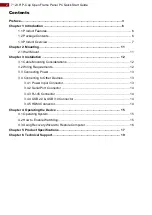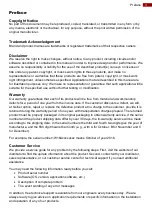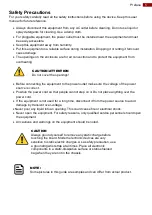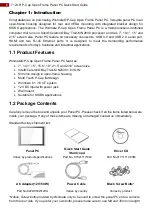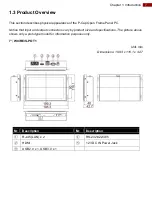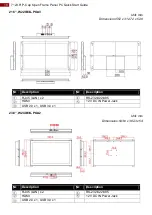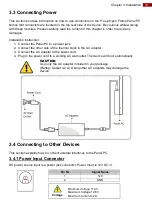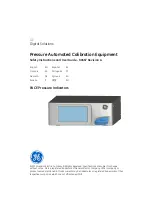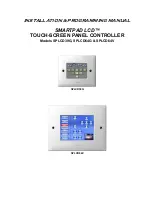
12
7~23.8" P-Cap Open Frame Panel PC Quick Start Guide
Chapter 3: Installation
This chapter provides hardware installation instructions and mounting guide for all available
mounting options. Pay attention to cautions and warning to avoid any damages.
3.1 Cable Mounting Considerations
For a nice look and safe installation, make sure cables are neatly hidden behind the device.
WARNING! / AVERTISSEMENT!
Observe all local installation requirements for connection cable type and
protection level.
Suivre tous les règlements locaux d’installations, de câblage et niveaux de
protection.
WARNING! / AVERTISSEMENT!
Turn off the device and disconnect other peripherals before installation.
Éteindre l’appareil et débrancher tous les périphériques avant l’installation
ALTERNATING CURRENT / MISE À LE TERRE!
To prevent electrical shock, the Safety Ground location on the rear must be
bonded to the local earth ground through a minimum 12 AWG wire as short as
possible.
Pour éviter les chocs électriques, l
’emplacement de la prise terre à l’arrière
doit être lié à terre locale, à travers un 12 AWG minimum et aussi court que
possible.
3.2 Wiring Requirements
The following common safety precautions should be observed before installing any electronic
device:
Strive to use separate, non-intersecting paths to route power and networking wires. If power
wiring and device wiring paths must cross make sure the wires are perpendicular at the
intersection point.
Keep the wires separated according to interface. The rule of thumb is that wiring that shares
similar electrical characteristics may be bundled together.
Do not bundle input wiring with output wiring. Keep them separate.
When necessary, it is strongly advised that you label wiring to all devices in the system.
Do not run signal or communication wiring and power wiring in the same conduit. To avoid
interference, wires with different signal characteristics (i.e., different interfaces) should be
routed separately.
Be sure to disconnect the power cord before installing and/or wiring your device.
Verify the maximum possible current for each wire gauge, especially for the power cords.
Observe all electrical codes dictating the maximum current allowable for each wire gauge.
If the current goes above the maximum ratings, the wiring could overheat, causing serious
damage to your equipment.
Be careful when handling the unit. When the unit is plugged in, the internal components generate
a lot of heat which may leave the outer casing too hot to touch.


